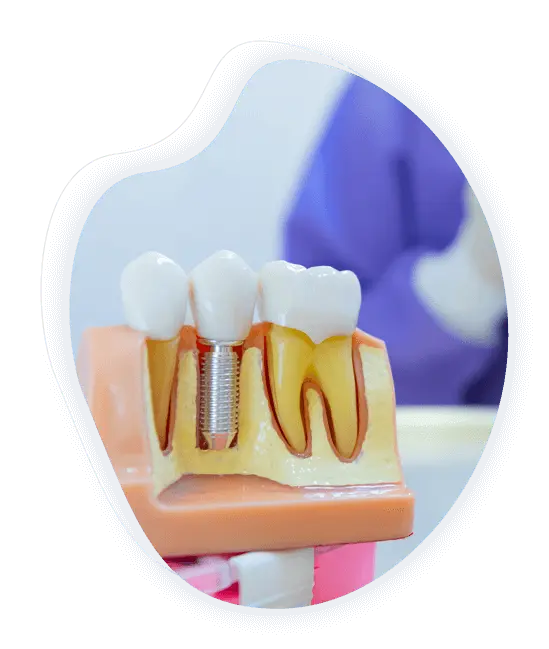Aram Clinic: The leader in cosmetic surgery
Dental implant in Tunisia:
fill all the gaps
Having gaps or missing teeth can feel extremely bad and sometimes you can feel weird about smiling, and it is worst when you can not eat you favorite foods because of dental problems.
I'm sure we all have been there, after all, everyone gets dental problems sooner or later.
Have you ever wondered 'what could I do to fix this', well if you feel self-concious about your missing teeth or you are unable to consume your favorite food then look no further because modern science has an answer to everything and this time it's called Dental implant.
Dental implant in Tunisia is highly known and is practiced by pretty much all dentists in the country, if you are looking for a way to fix up those gaps that keep bothering you in your mouth then look no further. Dental implant in Tunisia is highly adviced for people with those conditions and many others.

How much does Dental implant in Tunisia costs?
Dental implant in Tunisia is one of the most well-known dental procedures that is performed,
it's the
go to when someone suffers from tooth loss.
So being that way, the procedure is fairly cheap in fact Dental implant in Tunisia is
considered to be one of the cheapest dental procedures.
Any person with good enough budget can manage to get Dental implant in Tunisia and
you can
find your perfect dentist anywhere in the country.
Where can i get dental implant in Tunisia?
Tunisia is filled with highly educated, skillful and professional dentists that are well prepared to
do the procedure.
Dental implant in Tunisia is performed in many clinics and hospitals and basically all
dentists can perform it.
Most of the dentists that perform dental implant in Tunisia have a rich background of
high-level education from highly professional universities both in Tunisia and offshore.
What are Dental implants?
Sooner or later everyone will eventually have dental problems; one of the worst thing
that could happen is losing a tooth, having a gap while smiling can make many people
self-conscious.
And you as a person deserve to have the best features, we all strive to become
the best version of our selves.
Missing teeth can also lead to an alteration in your facial shape due the missing teeth causing you to throw your bite out of alignment.
The solution for all of this is dental implants.
They are artificial tooth roots that are planned surgically into the jawbone, after several months the bone around the implant surrounds it and grows in holding it down in place.
After that the dentist will attach the replacement artificial teeth with a metal connector to the implant to fill the gap.


What are the different types of dental implants?
Overall there are two major types of dental implants:
Endosteal
Also mean in the bone; they are the most common type of dental implants.
In shape they resemble a small screw and are usually made from titanium or some other
body-safe material.
Endosteal implants will take the place of tooth root because they are planned deep within
the jawbone allowing one implant to anchor one or several teeth.
Subperiosteal
Also called on the bone, this is done when there's not enough healthy jawbone to support a normal
endosteal implant.
Instead of drilling inside the jawbone Subperiosteal implants are places above or on the
bone to prevent any further damage to it.
What are the preparations for a dental implant?
The procedure requires a thorough and long preparation time, usually from 3 to 9 months, you may also have to meet with several types of dental specialist and oral surgeons before the treatment is complete.
The first step that the doctor would take is making a full examination of your teeth,
gum, and jawbone to determine weather you have enough healthy jawbone to support and
maintain
the implants.
Your gum must be free of periodontal disease, in the case of having a very thin
jawbone
your dentist will suggest having a bone graft or other procedure before starting the
treatment.
You will need to discuss the details of the operation with your dentist meaning the
number of teeth that will be replaced to determine the type of the procedure that you will
undergo.
You will also need to know weather the operation will probably need local anesthesia,
so
your doctor may instruct you on a fasting before the surgery.
What happens during the procedure?
Based on the examination your dentist will determine the type of implant that best suits you weather it's endosteal or subperiosteal.
If you are getting a endosteal implant, these are some of the steps that the dentist will do:
- The oral surgeon will make an incision in the gum exposing the jawbone underneath.
- Using a dental handpiece, the doctor will then drill deep holes in the bone where the implants will be installed.
- While you wait for the permanent tooth to be attached to the implant, you can choose to have a removable denture.
In the case of you choosing a subperiosteal implant, the doctor will not be drilling in the bone, so it won't cause any further damage.
Instead, the implant will be placed on top of the bone.
In both cases weather you choose subperiosteal or endosteal implant you will feel a minor discomfort and swelling afterwards.
The length of the discomfort varies between people it could last several days or you can proceed with your daily activities the next day.
What are the other procedures after the dental implant is installed?
Osseointegration
Usually, it takes a period of 2 to 6 months for the new bone to grow around the screw of the implant, this is known as osseointegration which means "combining with the bone."
In this procedure, the jawbone will grow and strengthen around the implant to keep firmly in place; this will allow the implant to function as an artificial tooth root.
Abutment placement
To connect the replacement tooth to the dental implant, the dentist will use a metal extender called an abutment placement.
This may be done in the initial surgery or during a secondary surgery using local anesthetic.
Having a second operation to install the abutment means that the surgeon will have to make a new incision if gum tissue has grown around the implant.
This happens because a healing cap is placed on top of the implant after it's been placed to protect it and prevents tissue from growing over it.
When the second procedure is accruing the healing cap will be removed and the abutment will be screwed onto the dental implant.
Placing the tooth
After some weeks your gum will be healed from the swelling, this is when the doctor makes an impression of your teeth so that your new permanent teeth can be made to fit you perfectly, these can be fixed or removable.
If you choose to have a fixed tooth, it will be permanently screwed on the abutment.
If you choose a removable tooth, it would be placed on top of a metal frame and attached to the abutment; this type of tooth is removable and you can clean it at home.
The new teeth will look as and feel as natural as you normal teeth, you will need to take care of them meaning brushing and flossing them daily and you will have to make sure you attend your regular checkups with your dentist.
What other options do i have besides dental implants?
Dental implants may not be the right option for everyone, in the case of you wanting to fix a lot of teeth it might get over your budget, so you will need to consider other options, some of them are:
Full implant
This procedure is when you need many teeth replaced, it's also called "all on four" or "all on six" depending on the number of implants you want to have per arch.
Much like normal implants you will have a removable denture that is able to snap into the implants.
The implants are sturdy enough to support several teeth up to 10 or 12 at a time either on the upper or lower arch of the mouth.
Dentures
Also known as "false teeth", they are put over the gum and they are removable. They can be full or partial, and they are less expensive than implants, however they will not last as long and you may need to keep replacing them.
Dental bridges
They are false teeth that are installed in place by the teeth on either side of the gap, they are drilled so that a crown can be placed on top of them.
However, the drilling won't be happening in the jawbone and they are much less expensive than implants and typically covered by dental insurance.
However, they might need to be replaced from time to time because they are less durable than implants.
What are the risks of getting a dental implant?
Much like any other medical procedure dental implants come with some riscks, some of them are:
- You can get an infection where the implant is put.
- The risk of damaging other teeth near it.
- Nerve damage.
- Sinus damage.
- gum recession.
Conclusion
It comes as a no surprise that dental implant is one of the most famous dental procedures in the
world and dental implant in Tunisia has a huge popularity, it's one of the most guaranteed ways to
regaining a beautiful smile and preventing problems like jaw deformation.
And with a highly professional staff dental implant in Tunisia is becoming the go to solution
for lost teeth.
Does dental implants hurt ?
Some sensitivity is to be expected once the anaesthetic wears off. However, this is usually not unbearable. Your dentist will probably recommend that you take an over-the-counter analgesic for any discomfort felt during the healing process. It is essential to follow all post-operative instructions provided by your dentist.
As a general rule, you should not feel much pain during the procedure or during the recovery period. If you do experience pain, especially several days afterwards, you should consult a health care professional or schedule a follow-up appointment with your dentist. Although surgery is not known for being painless, dental implants are one of the most accessible operations. Most patients compare the pain to that of a tooth extraction.
How Long Does It Take for Dental Implant Surgery to Heal ?
After around 7-10 days, most patients can resume a normal diet. In some cases, patients may be advised to follow a gentle diet for up to 6 weeks after the procedure. Dental implant recovery time and the healing process may be delayed or impeded by smoking, poor diet, excessive alcohol consumption and lack of proper dental care (such as regular brushing). We also recommend that dental implant patients avoid strenuous physical activity in the days following surgery to avoid dislodging the blood clot and causing bleeding. When it's time to go to bed, elevate your head by using extra pillows.
Other factors that can influence recovery time include the number of teeth that had to be extracted and implanted, whether the bone is healthy enough for the implants to bond, whether the procedure required bone grafting, and individual differences in healing time.
Maintaining oral hygiene and home care is essential for recovery and helps ensure that no plaque or infection forms around the gums. After 24 hours, you can also start rinsing gently with salt water, apply ice if necessary, and make sure you rest as much as possible.
How to brush teeth after dental implant ?
Before brushing your teeth, rinse your mouth with warm chamomile or sage water. If your dentist has prescribed other medications for cleaning the oral cavity, don't under any circumstances neglect rinsing with this medicine. You can use any toothpaste, but the toothbrush should have soft bristles. For interdental spaces, the use of an interproximal brush or brushette is recommended. The vertical surface of the teeth should be cleaned by sweeping movements from the gum to the upper edge of the crown; teeth in the upper jaw are cleaned from top to bottom, those in the lower jaw - from bottom to top. The chewing surfaces of the teeth are cleaned from front to back with horizontal movements. The final moments of tooth brushing include massaging the gums and cleaning the tongue, which also accumulates bacterial plaque.
Can i smoke after dental implants ?
Smoking can reduce the blood supply to the gums and teeth, also leading to implant failure. If you're a smoker, it's important to quit smoking before undergoing dental implant treatment. If you can't stop smoking, you may want to consider postponing your implant surgery while seeking help.
The patient should continue to avoid smoking for at least 2 months after implant placement, during which time bone healing would have progressed to the osteoblastic phase and early osseointegration would have been established.
How to eat after dental implants ?
In general, it's safe to eat immediately after oral surgery, as long as you only consume liquids and extremely soft foods for the first 24 to 48 hours. When consuming liquids after surgery, be sure not to use a straw, as this could cause injury to the incision area. If you're wondering how long before you can chew after dental implants, the answer varies from patient to patient, but in general, you should wait at least 1-2 weeks before resuming normal food consumption. Avoid spicy and crunchy foods.


